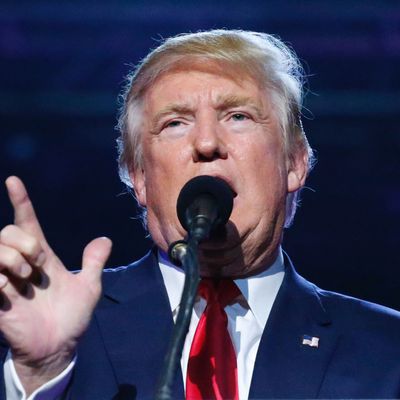
In recent days, Donald Trump has informed his followers that a cabal of international bankers is collaborating with Hillary Clinton and Mexican billionaire Carlos Slim to “rig” the American election and, thereby, bring a permanent end to democratic governance in the United States.
Over the weekend, surrogates for the Trump campaign insisted that the candidate was merely claiming that the election was being figuratively “rigged,” via the biased coverage of the liberal media.
The GOP nominee hastened to clarify that he thinks the election will be literally stolen through voter fraud at polling places.
Trump’s sustained argument against the legitimacy of American elections — combined with growing mutters about “revolution” among his supporters — has Republican leaders (understandably) nervous. Over the weekend, House Speaker Paul Ryan issued a statement saying, “Our democracy relies on confidence in election results, and the speaker is fully confident the states will carry out this election with integrity.” On Monday morning, Ohio’s Republican secretary of State Jon Husted called Trump’s rhetoric “irresponsible.”
“First of all, I can reassure Donald Trump: I am in charge of elections in Ohio, and they’re not going to be rigged. I’ll make sure of that,” Husted told CNN. “We have a bipartisan system of elections. Frankly, it’s the only place you can find Democrats and Republicans working cooperatively together.”
Trump responded to these reprimands with incredulity.
The mogul’s confusion about why Republicans would deny the existence of widespread voter fraud is understandable. After all, the GOP has spent much of the past decade warning the country that American elections are plagued by an epidemic of fraudulence. The principal argument behind the proliferation of voter-ID laws in GOP-controlled states is that electoral fraud is so pervasive, measures that deter it are justified, even when they disadvantage African-American voters. This is the worldview Husted has buttressed, in defending Ohio’s Voter ID law.
Trump has received particularly sharp criticism for his repeated suggestions that fraud will be prevalent in African-American communities. But this too is in keeping with GOP orthodoxy.
Here’s how the lead Republican sponsor of Georgia’s voter-ID bill defended the law to federal investigators, according to a Justice Department report:
If there are fewer black voters because of this bill, it will only be because there is less opportunity for fraud. [Burmeister] said that when black voters in her black precincts are not paid to vote, they do not go to the polls.
This view is not limited to state-level GOP officeholders. At a general election debate in 2008, Republican nominee John McCain suggested that ACORN — an association of community organizers that, among other things, registered African-American voters — was on the cusp of “destroying the fabric of American democracy.”
“We need to know the full extent of Senator Obama’s relationship with ACORN, who is now on the verge of maybe perpetrating one of the greatest frauds in voter history in this country, maybe destroying the fabric of democracy,” the “maverick” said.
For over a decade, the GOP has attempted to solve its problem with minority voters by enacting electoral reforms that reduce their presence at the polls. To rationalize such measures, the party invented a crisis of democratic legitimacy. Now, Trump is using that same crisis to rationalize his likely defeat.
There’s no question the mogul has amplified and exaggerated garden-variety GOP fearmongering about ballot stuffing in black districts — John McCain never argued that ACORN was being funded by globalists hell-bent on ending U.S. sovereignty.
But as with so many of Trump’s most dangerous messages, the difference between his stance on voter fraud and that of his party is one of degree, not of kind.
Republicans who insist on the necessity of voter-ID laws — and on the legitimacy of November’s election — should be asked how they square those two beliefs with the fact that multiple battleground states allow voters to cast ballots without any form of identification at all.






























